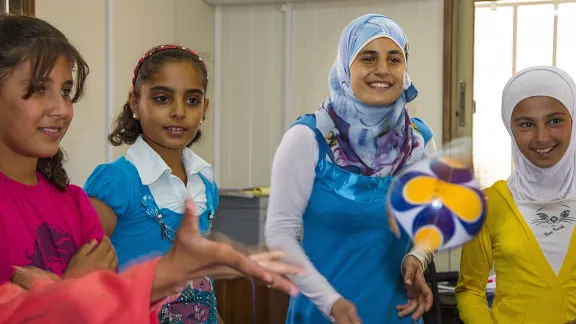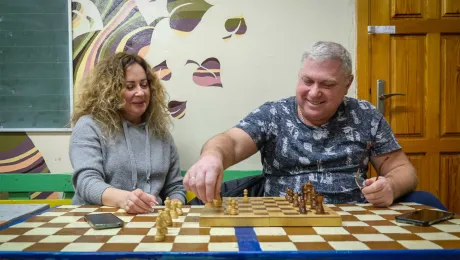
Children participating in the
By Jenny Skumsnes Moe, World Service Committee member, medical student and musician from the Church of Norway
The goal of my visit to the Zaatari refugee camp in Jordan in October was to get to know the Department for World Service (DWS) “Peace Oasis” project for psychosocial support and peace building, and its staff. I also wanted to connect with people interested in providing footage for a charity/donation video to promote the work of the project and a better understanding of the Syrian crisis.
It was a large mental process to go from the mass media presentation of the Syrian conflict seen from a safe distance away in Norway to the realities on the ground in the desert, only kilometers away from the war. Most people do not get an opportunity to enhance their understanding of the conflict by visiting and talking to people directly. Therefore, this experience of transition was important for me to reflect upon and will be useful in making an effective video.
At a distance, Zaatari Refugee Camp shimmered like a large white lake in the desert, the UNCHR-tents reflecting the October sun. As we approached, there were massive lines of people walking in and out of the camp. Tuesday is visiting day and many Syrians settled in the host communities came to see friends and relatives in the camp. Encircled by fences and mounds, the camp is divided into 12 districts and enclosed encampments for NGOs and camp management staff.
The Lutheran World Federation’s (LWF) Wejdan Jarrah briefed me on the guidelines for psychosocial support-projects, including Peace Oasis. The project aims to reduce violence in the camp and the name was suggested by one of the participants. It reflects their view of what this project is: a peaceful and energizing oasis in the desert, to relieve aggression and learn how to best solve conflicts. Peace Oasis activities focus on self-esteem, respect, expression and recognition of emotions, anger management, empathy, conflict resolution and peace building in the community. This happens through group discussions, creative workshops, vocational training and sports such as football and taekwondo.
Syrians from the camp, who are also refugees, lead the workshops and group activities. I was very impressed by their leadership skills, energy and passion for their work. Some said the project had given them a new sense of purpose, which had been missing since they were uprooted from Syria. Several were former students or had had an active career before they were forced to flee their homes and give up on their plans for the future. Their stories about the escape; what they could and couldn't bring, the things they miss and their hopes for the future, all expressed a heartfelt wish to return to Syria, continue their studies and see friends and families again.
I am deeply grateful for the opportunity to visit the Zaatari refugee camp and I am very proud to be a member of an organization that makes this work happen. Ms Jarrah's leadership, knowledge in the psychosocial field and commitment to the participants and staff I believe will have widespread positive effects. Still, on a large scale psychosocial support work is little known to the average donor/church and could benefit greatly from more visibility and also be connected to other NGOs and other LWF-projects for mutual sharing and network building so that the competence is increased on a general level. Anger management and conflict solving is of uppermost importance when it comes to rebuilding societies and preventing people inflicting violence and death on others and themselves.
The visit also outlined three other important subjects: refugee/immigration-politics in our respective countries, and how we as citizens and as an organization have a responsibility to work for a better policy that enables uprooted people the possibility of rebuilding their lives as they wait to return to their homeland or new homes. There is a need to show what interreligious dialogue is already taking place and intensify this work in order to reduce sectarianism, strengthen the theological arguments for non-violence and, in cooperation with Islamic authorities, analyze and denounce what ISIS call theology, and respond to the fear of many people of this organization. Lastly, we need to continue to support Arab Christians who are fleeing the region.
In Luke 19, 41-42, Jesus wept as he looked out over Jerusalem because people were unable to recognize what would have given them peace. 2,000 years later, we are still crying over a world capable of so much but still incapable of saving innocent lives from death and the trauma of war. I believe that psychosocial support, anger management and conflict resolution are cornerstones, and a compassionate world, which understands the need for livelihood opportunities and respects human life, is the foundation. As privileged world travellers, it is our opportunity and responsibility to do what we can to increase compassion and understanding. I hope and believe that my video project will contribute to that purpose.
“I used to have a dream but it’s been blown away by the winds of this place. My dream was to go to university and study pharmacy. It was on my mind and in my heart but it’s been reduced to ash.” (Heba, 17, Zaatari refugee camp in Jordan. UNICEF article on Education Interrupted)
The music video currently in preparation will be released by the LWF in early 2015. All proceedings go towards DWS.


